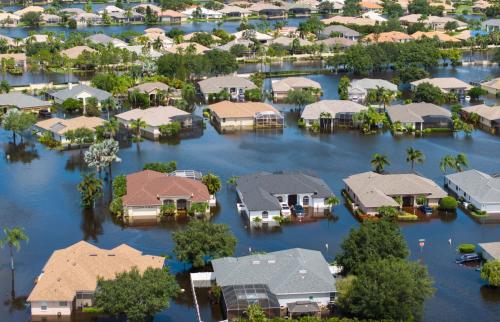On Wednesday, November 25, Pope Francis began his six-day tour of Kenya, Uganda, and the Central African Republic, where he is expected to touch on issues of mutual importance to the Catholic Church and African continent, including promoting peace and interfaith dialogue, reducing poverty and inequality, upholding human rights, and addressing climate change. This trip will mark his first apostolic visit to Africa and will equally serve to underscore the growing importance of Africa to the Catholic Church—especially given that the number of Christians in the region is expected to double between 2010 and 2050, from 517 million to more than 1.1 billion.
Pope Francis’ trip will begin in Nairobi, where he will visit congregants of a parish in Kangemi settlement, one of the poorest neighborhoods of the city, and speak with representatives at the United Nations Environment Program (UNEP), where climate change will be at the top of the agenda—just days before international leaders convene in Paris for a global conference on climate change (COP21). Next, he will travel to Kampala where LGBT rights advocates hope that he may address Uganda’s strict anti-homosexuality laws and expound a message of greater tolerance. Finally, he is expected to spend a day in the Central African Republic to shed light on the country’s neglected crisis and ongoing insecurity.
Despite the acute renewal of violence recently in the Central African Republic, the Vatican is moving forward with its plans for the pope to spend 26 hours in the capital of Bangui; although if the violence does intensify, his itinerary may be adjusted. Meanwhile, the country is in the midst of preparations for national elections next month, with a constitutional referendum scheduled for December 13 and presidential elections for December 27.
As the pope’s visit brings the world’s attention to the complex humanitarian and political crisis in the Central African Republic, here are a few links to some background materials on the conflict and prospects for peace:
- Events with Interim President of the Central African Republic Catherine Samba-Panza (“Peace and Development in the Central African Republic: A Conversation with Her Excellency Catherine Samba-Panza”) and the highest-ranking Catholic, Muslim, and Protestant leaders of the Central African Republic (“Peace and Stability in the Central African Republic”) emphasize the need for interreligious cooperation as a prerequisite to security and reconciliation.
- A recent report, “Emerging from crisis: The role of economic recovery in creating a durable peace for the Central African Republic,” discusses the country’s path to recovery, including the implementation of a holistic disarmament, demobilization, and reintegration (DDR) program, promoting inclusive governance, and prioritizing economic recovery within the broader peacebuilding agenda.
- A event among CAR experts, U.S. government and CAR government officials, and on-the-ground stakeholders (“Addressing crisis, supporting recovery: The Central African Republic at a crossroads”) on the recovery efforts that hinge on the success of immediate stabilization and peacebuilding priorities, including national elections as well as the need to promote long-term civic inclusion and inclusive economic growth.
The Brookings Institution is committed to quality, independence, and impact.
We are supported by a diverse array of funders. In line with our values and policies, each Brookings publication represents the sole views of its author(s).




Commentary
Pope Francis in Africa: Background on his trip and the situation in the Central African Republic
November 25, 2015